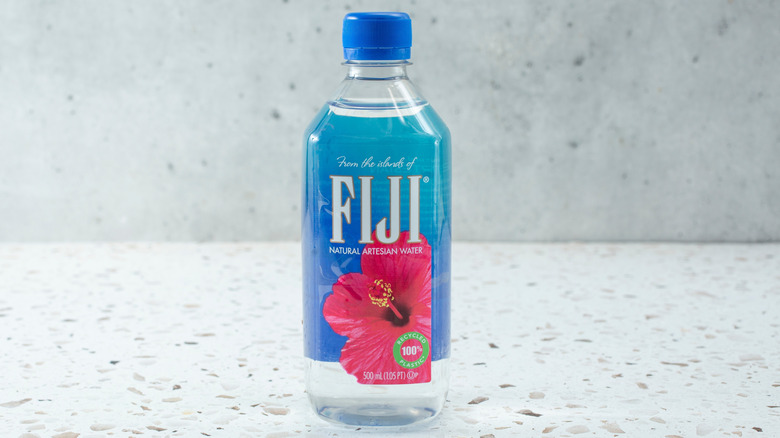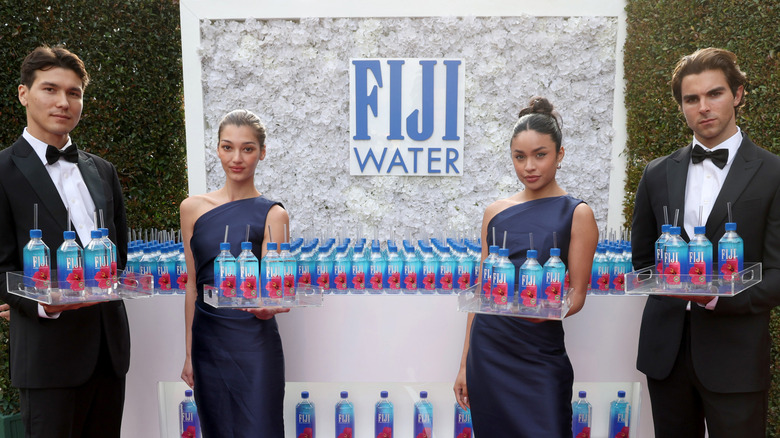Is Fiji Water Worth The Money Or Overpriced? It's Complicated.
When you're out and about and need to hydrate, a bougie bottle of Fiji Water starts to sound pretty good. Is the water loved by Hollywood's elites worth the price? It is certainly expensive — at Target, bottles of Fiji Water retail for around $8 for a pack of six whereas you can get 24 bottles of Dasani water for about $5.30. Whether premium bottled water like Fiji is worth the extra cost has been a subject of much debate.
In 2006, Fiji launched an ad campaign with the tagline, "The label says Fiji because it's not bottled in Cleveland" (via Washington Post). This marketing move caught some flak when Cleveland city officials analyzed Fiji Water and discovered it contained arsenic. Not that that's particularly unusual, given that arsenic is a naturally occurring compound. It's only in large doses that it becomes poisonous to us. The 6 micrograms of arsenic which the Cleveland water commissioner discovered is well below the 10 microgram limit established by the FDA as safe (Whole Foods' bottled water has over 9 micrograms of arsenic in it). More recent studies show Fiji's arsenic levels at a mere 1 microgram per bottle, suggesting increased safety measures were established as a result.
Consumer preferences ebb and flow over time, though. Some one-time consumers are no longer fans of Fiji's velvet taste. In a 2024 post in r/HydroHomies, dozens of users agreed the water doesn't taste like it used to. Taste is subjective, though. Whether you enjoy drinking it or not is up to you. Still, there must be a reason Fiji Water is touted by so many public figures.
Fiji Water controversies
Fiji Water is sourced from an aquifer in the island country of its namesake, where it's been reported that some inhabitants don't have access to clean drinking water. Whether that's the responsibility of the bottled water company or not, it's a feature that critics enjoy pointing out.
Advocacy groups have also been critical of the company's promise of going "carbon negative," a lofty goal for a business that ships its products thousands of miles overseas. In 2011, Fiji Water was sued for false advertising because of this carbon negative claim. The outcome of the case was not widely publicized, but the legal troubles involved suggest no good deed gone unpunished. Fiji Water became the first bottled water company to release data on its carbon footprint. Whether other companies will follow suit given the legal risks and cultural backlash remains to be seen.
Fiji Water faced legal action again in January 2025 when the Plastic Pollution Coalition filed a complaint alleging the company was misleading consumers by calling the product "natural artesian water" which was "protected from external elements." The complaint argued these claims weren't accurate because of alleged BPA and microplastic contamination. In March 2025, a federal court in Illinois rejected the case, citing insufficient evidence. Studies examining samples of other brands have detected microplastics in much of our water, but Fiji was not included in that research. The company was part of a bottled water recall that affected millions (it had to do with low-risk bacteria, not plastics). All in all, the company has weathered significant backlash as a luxury product while retaining its smooth, crisp taste. Stay classy, Fiji.

